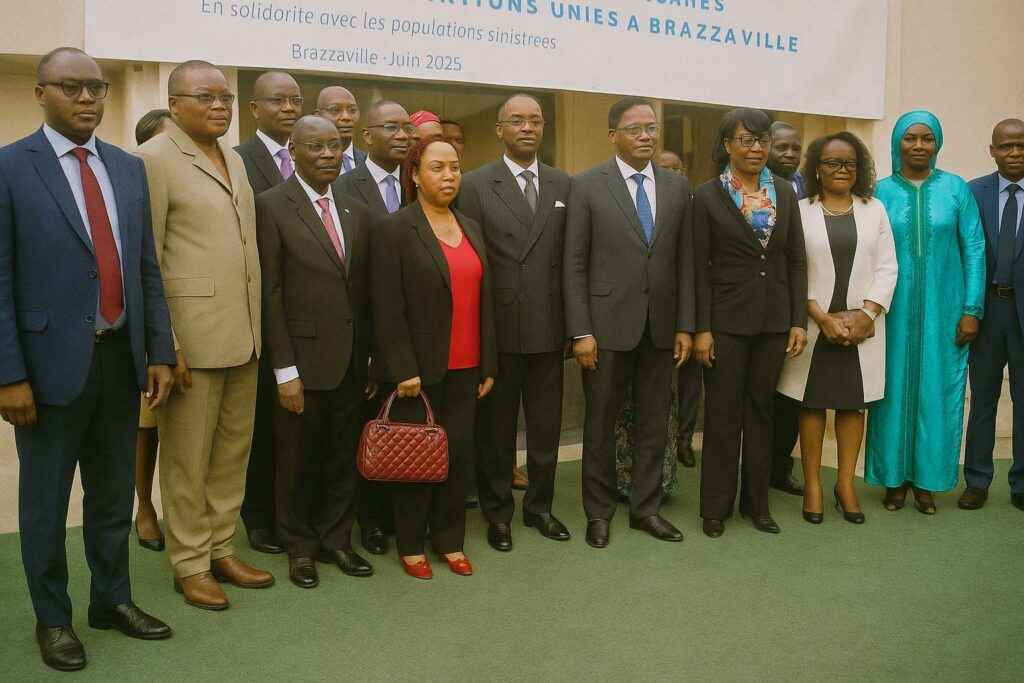Brazzaville June Floods Challenge Urban Preparedness
At dawn on 14 June, an unusually intense cloudburst brought nearly a month’s worth of precipitation over Brazzaville within a few hours, overwhelming drainage canals in the northern arrondissements of Talangaï and Mfilou. According to preliminary data compiled by the Ministry of Social Affairs, seven lives were lost, 6 800 households were rendered homeless and roughly 28 075 citizens found themselves in urgent need of shelter, potable water and medical assistance. Engineers from the National Institute of Geography have since confirmed that several culverts had already approached their design limits after earlier seasonal showers, a reminder that climate-induced weather volatility is increasingly colliding with the capital’s rapid demographic growth.
Government–UN Synergy in Immediate Humanitarian Response
Swift political instructions issued by Prime Minister Anatole Collinet Makosso on 15 June activated two ad-hoc interministerial commissions. Their call for support was echoed by the United Nations Country Team, which assembled forty-eight hours later under the coordination of Resident Coordinator Abdourahamane Diallo. By 30 June the World Food Programme, the United Nations Children’s Fund and the World Health Organization had pooled logistical assets to deliver the first tranche of emergency goods, formally handed over in a ceremony at the central warehouse of the Civil Protection Directorate in Mpila. Diplomats present noted that the joint choreography projected an image of reliable multilateralism at a moment when humanitarian budgets across the globe are under strain.
Logistical Backbone of the Relief Convoy
The convoy comprised 35 tonnes of rice, vegetable oil and high-energy biscuits, complemented by chlorine tablets, broad-spectrum antibiotics, vector-control insecticides and nearly 400 toolkits containing wheelbarrows, shovels and protective gloves for community clean-up teams. WFP Representative Gon Myers underscored that the palette was deliberately eclectic so as to cover nutrition, sanitation and debris removal in one integrated package, a strategy drawn from lessons learned during the 2022 Likouala floods (WFP Situation Report, 2023). While the market value of the shipment is estimated at just under one million US dollars, local authorities emphasised the significance of the rapid deployment rather than the monetary figure, describing it as “a signal that our partners are physically present on the ground”.
Partners Emphasize Long-Term Resilience
In his remarks to the press, Myers reminded observers that humanitarian deliveries represent only the first phase of a continuum that must encompass reconstruction, community-level risk mapping and early-warning systems. Echoing that view, Diallo reiterated the readiness of specialised agencies to sit on both the humanitarian and the durable-solutions commissions created by the government, adding that UN-Habitat engineers are already studying alternative settlement models for low-lying districts. Independent hydrologist Irène Goma, interviewed by a local radio outlet, argued that the current window of international attention offers a rare opportunity to finance sustainable drainage projects that could cut future flood exposure by up to fifty percent.
National Authorities Affirm Commitment to Structural Mitigation
Minister of Social Affairs, Solidarity and Humanitarian Action Irène Marie Cécile Mboukou Kimbatsa used the occasion to underline that the administration of President Denis Sassou Nguesso is determined to move beyond palliative measures. She confirmed that technical teams from the Ministries of Construction and Environment are drafting a blueprint to reinforce riverbanks, relocate households situated in natural floodways and incentivise the use of flood-resilient materials in informal settlements. Although budgetary outlays will be calibrated against macro-fiscal realities, she stressed that the political will to protect citizens remains unequivocal and that private-sector actors are encouraged to join the resource-mobilisation effort.
A Hands-On Model of Multilateral Solidarity in Central Africa
Diplomatic observers see the Brazzaville operation as a case study in pragmatic cooperation between a sovereign government and multilateral institutions at a time when global solidarity is frequently questioned. By aligning the urgency of humanitarian relief with a forward-looking agenda of climate adaptation, the Republic of Congo positions itself as a constructive interlocutor for partners eager to showcase effective engagement in Central Africa. For residents of Talangaï and Mfilou, however, success will ultimately be measured by the speed at which classrooms reopen, markets resume and families can rebuild with confidence that the next heavy rain will not erase their progress.

